

Bibliography - Rockefeller: Kissed by Black Gold. Vindicating Capitalism: The Real History of the Standard Oil Company. Summer 2008Vol. 3, No. 2 This article is from TOS Vol. 3, No. 2.
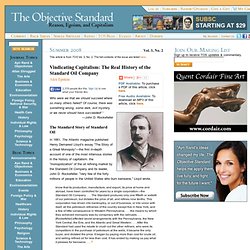
The full contents of the issue are listed here. Alex Epstein Free Audio Available: To download an MP3 of this article, click here. Who were we that we should succeed where so many others failed? Standard Oil Co. of New Jersey v. U.S., 221 U.S. 1 (1911) Antitrust Law. Legislation enacted by the federal and various state governments to regulate trade and commerce by preventing unlawful restraints, price-fixing, and monopolies, to promote competition, and to encourage the production of quality goods and services at the lowest prices, with the primary goal of safeguarding public welfare by ensuring that consumer demands will be met by the manufacture and sale of goods at reasonable prices.
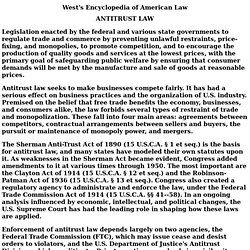
Antitrust law seeks to make businesses compete fairly. Antitrust Division Antitrust Laws and You. Many consumers have never heard of antitrust laws, but enforcement of these laws saves consumers millions and even billions of dollars a year.
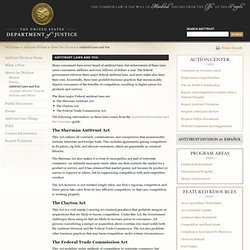
The federal government enforces three major federal antitrust laws, and most states also have their own. Essentially, these laws prohibit business practices that unreasonably deprive consumers of the benefits of competition, resulting in higher prices for products and services. The three major Federal antitrust laws are: Supreme Court Orders Standard Oil Company to Be Broken Up. Sherman Antitrust Act. It has since, more broadly, been used to oppose the combination of entities that could potentially harm competition, such as monopolies or cartels.
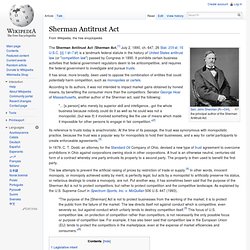
According to its authors, it was not intended to impact market gains obtained by honest means, by benefiting the consumer more than the competitors. Senator George Hoar of Massachusetts, another author of the Sherman act, said the following: "... [a person] who merely by superior skill and intelligence...got the whole business because nobody could do it as well as he could was not a monopolist.. (but was if) it involved something like the use of means which made it impossible for other persons to engage in fair competition Its reference to trusts today is anachronistic. John D Rockefeller and Standard Oil. The nightmare begins... Index | Homepage | Good Links | Bad Links | Search | Guestbook/Forum Consumerism | Railways | Fares Fair | NCL | GM | JD Rockefeller The oil industry and destruction of public transport A tainted philanthropy Ida Tarbell's exposes Standard Oil.
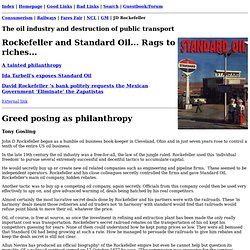
Getting Started. Understanding the Rules and Theme What do I do first?

Read the rules... Before you begin work on an entry for competition, you, your teacher, and your parents should carefully read the National History Day Contest Rule Book. Contact your district or state coordinator to learn if any rules have been revised since the publication of this rule book, and for more information on topics, sources, and deadlines.
Www.nhd.org/images/uploads/2010rulebook.pdf. Www.nhd.org/images/uploads/NHD Web Site Category Info - studentteacherREVISE.pdf. Pds/gilded/power/text1/octopusimages.pdf. John D. Rockefeller in The Gilded Age. John D.
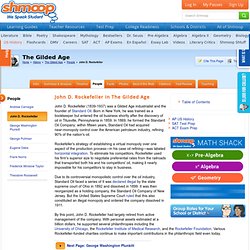
Rockefeller (1839-1937) was a Gilded Age industrialist and the founder of Standard Oil. Born in New York, he was trained as a bookkeeper but entered the oil business shortly after the discovery of oil in Titusville, Pennsylvania in 1859. In 1869, he formed the Standard Oil Company; within fifteen years, Standard Oil had acquired near-monopoly control over the American petroleum industry, refining 90% of the nation's oil.
Rockefeller's strategy of establishing a virtual monopoly over one aspect of the production process—in his case oil refining—was labeled horizontal integration. To eliminate his competitors, Rockefeller used his firm's superior size to negotiate preferential rates from the railroads that transported both his and his competitors' oil, making it nearly impossible for his competitors to stay in business. Spindletop - The Boom that Shook the World - People. As of July 1, 2013 ThinkQuest has been discontinued.
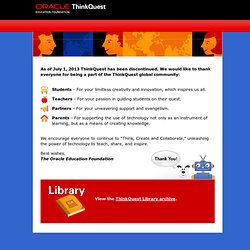
We would like to thank everyone for being a part of the ThinkQuest global community: Students - For your limitless creativity and innovation, which inspires us all. Teachers - For your passion in guiding students on their quest. Partners - For your unwavering support and evangelism. John D. Rockefeller Video — History.com. John D. Rockefeller — History.com Articles, Video, Pictures and Facts.
In 1865, Rockefeller borrowed money to buy out some of his partners and take control of the refinery, which had become the largest in Cleveland.
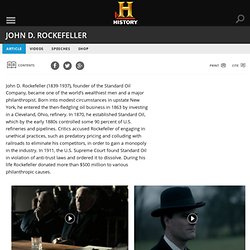
Over the next few years, he acquired new partners and expanded his business interests in the growing oil industry. At the time, kerosene, derived from petroleum and used in lamps, was becoming an economic staple. In 1870, Rockefeller formed the Standard Oil Company of Ohio, along with his younger brother William (1841-1922), Henry Flagler (1830-1913) and a group of other men. The Standard Oil monopoly, by the Linux Information Project. The saga of Standard Oil ranks as one of the most dramatic episodes in the history of the U.S. economy.
It occurred at a time when the country was undergoing its rapid transformation from a mainly agricultural society to the greatest industrial powerhouse the world has ever known. The effects of Standard Oil on the U.S., as well as on much of the rest of the world, were immense, and the lessons that can be learned from this amazing story are possibly as relevant today as they were a century ago. United States antitrust law. United States antitrust law is a collection of federal and state government laws, which regulates the conduct and organization of business corporations, generally to promote fair competition for the benefit of consumers.
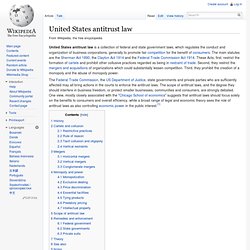
Clayton Act legal definition of Clayton Act. Clayton Act synonyms by the Free Online Law Dictionary. Sherman Antitrust Act Definition. The history of the Standard oil company - Ida Minerva Tarbell. Timeline Oil. 1815 Jul 9, The 1st US natural gas well was discovered. (MC, 7/9/02) 1855 Organic chemist Benjamin Stillman laid the foundations for the Pennsylvania oil rush by his discovery that petroleum could be distilled into lubricants and kerosene for cooking and illumination. Suddenly there was a use for the crude oil that seeped to the surface, annoying farmers by ruining the land and polluting the water supply. (HNPD, 10/4/98) 1859 Aug 27-28, The US oil business was born in Titusville, Pa.
Timeline - ExxonMobil - Energy & Natural Resources - Strengths - Dolph Briscoe Center for American History. The corporate entities that would become Exxon and Mobil began the 20th century as components of one company. At the end of the century, they came together as a single premier organization. Each company placed an individual imprint on the energy industry and on a dynamic era of world history. Both Exxon and Mobil trace their roots to the late 19th century, when American industry was booming in numerous sectors—steel, railroads and banking, to name a few. The nation's young petroleum industry picked up the pace, too, to meet the growth in demand for its products.
History Timeline. 1859: Colonel Drake Strikes Oil "Colonel" Edwin Drake, one-time railroad conductor, drilled the first commercial oil well in Titusville, Pennsylvania. Timeline . The Rockefellers . American Experience . WGBH. John D. Rockefeller, Standard Oil and World Monopolies. By Alex Christopher 1993 extracted from 'Pandora's Box. Oil History Timeline. A History of the Standard Oil Company and its successors. Click HERE for answers to some Frequently Asked Questions Standard Oil : Pre-1911 or go to 191119411961Today World. Monopoly. A monopoly is distinguished from a monopsony, in which there is only one buyer of a product or service; a monopoly may also have monopsony control of a sector of a market.
Likewise, a monopoly should be distinguished from a cartel (a form of oligopoly), in which several providers act together to coordinate services, prices or sale of goods. Monopolies, monopsonies and oligopolies are all situations such that one or a few of the entities have market power and therefore interact with their customers (monopoly), suppliers (monopsony) and the other companies (oligopoly) in ways that leave market interactions distorted. [citation needed] Monopolies can be established by a government, form naturally, or form by integration. Standard Oil. In re Gault. Gerard Gault was 15 years old when he was sentenced to a maximum of six years in a juvenile correctional facility for making an obscene phone call to a neighbor while on probation for another offense. If Gault had been an adult, the maximum penalty for his crime would have been a fine of $50 or two months in jail. Worse than the disparity in sentencing was the fact that Arizona (like many other states at the time) gave juvenile defendants almost no rights.
Korematsu v. United States. Fred Korematsu was an American citizen who grew up in the San Francisco Bay Area. In May 1942, the federal government began interning Japanese Americans in camps because of security fears during World War II. (This was authorized by Executive Order 9066.)
People to Contact.